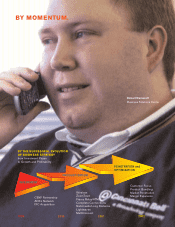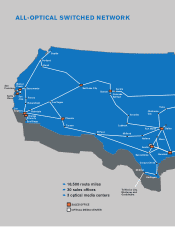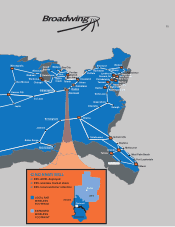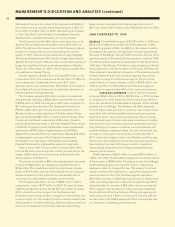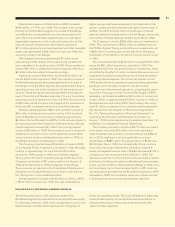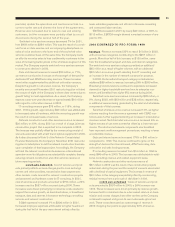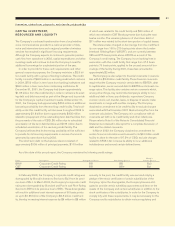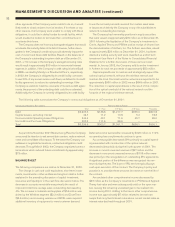Cincinnati Bell 2001 Annual Report Download - page 25
Download and view the complete annual report
Please find page 25 of the 2001 Cincinnati Bell annual report below. You can navigate through the pages in the report by either clicking on the pages listed below, or by using the keyword search tool below to find specific information within the annual report.
23
DISCUSSION OF OPERATING SEGM E NT RE S U LTS
The following discussion of the operating results of the
Broadband segment is presented on an as-reported basis except
for information related to 1999, which is presented on a pro forma
basis because it represents the best basis for comparison of
trends and operating results. The Local, Wireless and Other seg-
ments are discussed on an as-reported basis since there is no
distinction between pro forma and as-reported results with
respect to these segments.
Depreciation expense of $346 million in 2000 increased
$186 million, or 117%, over 1999. This increase was incurred
primarily by the Broadband segment as a result of the Merger
and reflects the continued build out of its national optical net-
work. The Local and Wireless segments also incurred higher
depreciation expenses as both continued construction of their
regional network infrastructures. Amortization expense of
$114 million pertains to purchased goodwill and other intangible
assets and represented a $92 million increase over 1999, due
almost exclusively to the Merger.
The Company recorded approximately $1 million in net
restructuring credits relating to the restructuring initiative that
was undertaken in the fourth quarter of 1999. These credits con-
sisted of $1 million in additional severance expense, offset by a
$2 million reduction related to lease terminations.
Operating income of $39 million declined $100 million ver-
sus the $139 million reported in 1999. The operating income of
the Broadband segment decreased significantly as a result of
the Merger, while the Other segment also experienced a drop in
operating income due to the introduction of new products and
services. These decreases were partially offset by the improve-
ment of the Local and Wireless segments. On a pro forma basis,
operating income increased from a loss of $145 million to income
of $39 million as the Company fully integrated the operations of
the former IXC, increased revenue and controlled expenses.
Minority interest expense of $44 million in 2000 consists of
$49 million in dividends and accretion on the 121⁄2% preferred
stock of Broadwing Communications offset by approximately
$5 million that is attributable to AWS’s 19.9% minority interest in
the operating loss of the Company’s wireless business. Minority
interest expense increased $47 million from minority interest
income of $3 million in 1999. The increase is due to a full year of
dividends and accretion on the 121⁄2% preferred stock in 2000
versus only two months of dividends and accretion in 1999, as
the Merger took place on November 9, 1999.
The Company recorded nearly $16 million in losses in 2000
on the Applied Theory investment accounted for under the equity
method, or approximately 1% more than the $15 million
recorded in 1999. Losses in 1999 were related to Applied
Theory and a 13% share of operating losses of IXC due to the
Company’s ownership of IXC common stock from August 16,
1999 to the November 9, 1999 closing date of the Merger.
These amounts are reported in the Consolidated Statements of
Operations and Comprehensive Income (Loss) under the cap-
tion “Equity loss in unconsolidated entities.”
Interest expense increased to $164 million in 2000, a 165%
or $102 million increase over 1999. This was attributable to
higher average debt levels necessary to fund expansion of the
optical, wireless and local networks and higher interest rates. In
addition, the 2000 amounts reflect an entire year of interest
expense related to the debt used to fund the Merger, versus only
two months of interest expense related to such debt in 1999.
The Company incurred a $356 million loss on investments in
2000. This was the result of $405 million in realized losses on
the PSINet, Applied Theory and ZeroPlus.com investments, net
of $49 million in realized gains on the sale of the Company’s
investment in PurchasePro.com. No such losses were incurred
in 1999.
The income tax benefit of $166 million increased $197 million
versus the $31 million tax provision recorded in 1999. This
resulted primarily from recognized losses on investments, some-
what offset by the effect of certain nondeductible expenses such
as goodwill amortization and preferred stock dividends treated
as minority interest expense. The income tax provision for the
1999 period reflects an expense as operating losses generated
by Merger were included in results for only two months.
Income from discontinued operations, comprising the opera-
tions of the Company’s former Cincinnati Bell Supply (“CBS”)
subsidiary, contributed an additional $0.2 million in income (net
of tax) in 2000, or approximately $3 million less than in 1999, as
the business was sold in May 2000. The Company also recog-
nized $1 million in expense from a cumulative effect adjustment
that resulted from the adoption of Staff Accounting Bulletin
No. 101, “Revenue Recognition in Financial Statements” as
required by the Securities and Exchange Commission on
January 1, 2000 and all periods prior to adoption (see Note 1 of
the Notes to Consolidated Financial Statements).
The Company reported a net loss of $377 million as a result
of the above, versus the $31 million net income reported in
1999. Dividends and accretion on preferred stock were $8 mil-
lion in 2000, resulting in a net loss applicable to common
shareholders of $385 million. The loss per share of $1.82 was
$2.02 higher than in 1999, but included a $1.00 per common
share loss pertaining to investments. Excluding investment
losses, the adjusted loss per share of $0.82 decreased $1.02 in
comparison to the income per share of $0.20 in 1999. The
decrease in both the net income and income per share is related
to inclusion of a full year of results from Broadwing Communications
versus only two months of results after the Merger in 1999. On a
pro forma basis, the net loss increased by 6% or $21 million as
operating losses generated by the Broadband segment in 1999
decreased in 2000, but investment losses net of taxes incurred
in 2000 grew by more than the operating loss declined.


